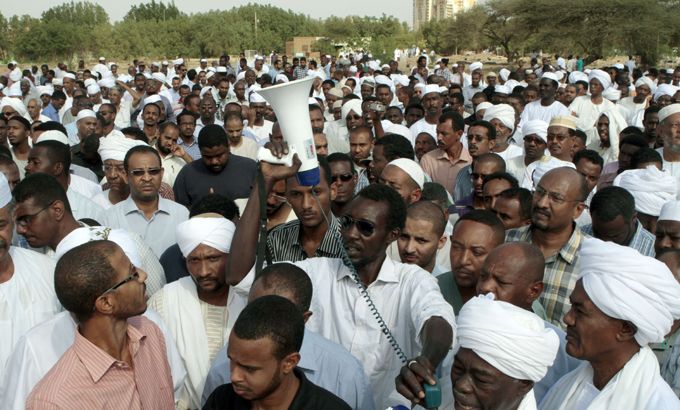Deadly fuel-hike protests continue in Sudan
Demonstrations sparked by fuel and gas price rises gain momentum with some protesters calling for fall of government.

Sudanese security forces have opened fire on demonstrators, with at least four people reported to have died, as thousands marched through the streets of the capital in continuing protests over fuel price hikes.
About 3,000 people, angered by a police crackdown on previous protests, also demonstrated after Friday prayers in Khartoum’s twin city Omdurman, across the Nile, shouting “Freedom! Freedom!” and “The people want the fall of the regime!”. Clashes also took place in the city of Wad Medani.
Police on Saturday confirmed that four civilians had been killed, but blamed the deaths on “unknown shooters”. At least 700 people involved in Friday’s demonstrations were arrested.
On Saturday, thousands of mourners escorted the funeral procession of one of the victim’s of the latest violence in the capital Khartoum.
The protests over the last week, in which at least 50 people have been shot dead according rights groups, are seen as the biggest domestic challenge faced by President Omar al-Bashir since he came to power after a coup in 1989.
Al Jazeera’s Harriet Martin, reporting from Khartoum on Saturday, said that it was “impossible to verify how many people have been killed”, and that while the government put the figure at 33, medical sources had said it could be as high as 200.
Speaking to Al Jazeera, Sudan’s information minister said the government had expected anger after it withdrew the fuel subsidy, but that demonstrations had turned into “riots”.
“We [were] expecting some sort of demonstrations and this is usual as happens in any country that does such reforms, this happens and we said that we shouldn’t actually interfere and we shouldn’t use any sort of violence against the demonstrators, but it is not a demonstration, it is exactly actually some sort of riot,” said Ahmed Bilal Osman.
“Some sort of gangs [are] attacking people, burning stations burning shops, stealing and doing some sort of terroristic action, that’s why we interfered after the third day.”
‘Shoot-to-kill’ policy
On Thursday, human rights groups had blamed the government of violent repression of protesters by adopting a shoot-to-kill policy.
Police fired teargas at protesters on Friday, sending some protesters running for cover. But most remained, some hurling stones at the police, others torching cars.
More than 2,000 people protested in Khartoum’s northern Bahri district, a hot-spot for days of unrest, and other areas, witnesses said.
“People will not be stopped by the killings until this rotten regime leaves,” one witness and Umma Party member, Mohammed al-Mahdi, told the AP news agency.
Witnesses reported that security forces had opened fire on protesters in eastern Khartoum.
Sudan’s economy was severely hit after South Sudan broke off and became an independent state in 2011, taking Sudan’s main oil-producing territory.
Al Jazeera’s Martin said that it was unclear whether the government’s use of of force would “keep the people from taking to the streets, or … give them more reason to do so”.
Speaking to Al Jazeera on Saturday, Sudanese youth activist Hajooj Kuka said that the situation in Sudan was “like a warzone”.
“The government is really tight on money to the point that they need that [money] to survive but that does not explain why [government retaliation] was so harsh from the beginning,” he said.
The activist from the Girifina youth movement said that his group had documented at least 200 deaths since the violence began.
Fuel subsidies cut
Protests first erupted this week in the town of Wad Madani, south of Sudan’s capital, then spread to Khartoum and seven other cities after the government cut subsidies on fuel and gas on Sunday, causing prices to rise.
Angry protesters torched police and gas stations and government buildings, while students marched chanting for Bashir’s ousting.
The subsidy cuts are part of a programme worked out with the International Monetary Fund aiming at salvaging the economy after the break with the south, seeking to cut state spending while encouraging non-oil sectors.
Bashir justified the new measures, saying they would rescue the country from “collapse”.
Information Minister Osman said the protests following the announcement were “very usual” and that the government was aware that the measure was “hard and it is a bitter thing” for Sudan’s citizens.
The US, meanwhile, has condemned the clashes this week calling the state’s response “heavy handed” and disporportionate.”
“Such a heavy-handed approach by Sudanese security forces is disproportionate, deeply concerning, and risks escalation of the unrest,” said US State Department spokeswoman Jen Psaki on Friday.